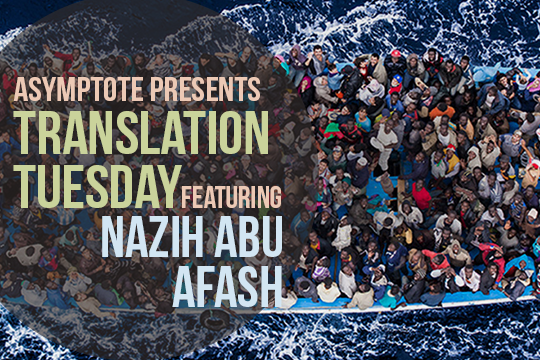In these poems, published in the Lebanese daily al-Akhbar under the overarching title “An Incomplete Diary”, the renowned Syrian poet Nazih Abu Afash dissects the benign indecisiveness of human nature by seeking refuge in the quietness and silence of words, his words, in the face of the noises generated daily by the ongoing war in Syria.
Abu Afash, like a lonely shepherd, counts his flock with no intention of committing remembrance to the act of existence per se, but to remind us of one thing: I am returning to die in the forest. The following are translations of this vulnerability into another form of vulnerability where contemplation can be as valid as involvement.
All were human: some returned disfigured, with incomplete eyes, incomplete shoulders, and incomplete dreams. Some still clutched their wilted flags envying themselves for the kisses, tears and garlands awaiting them. Some stopped in the middle of the road to stare at the buses, the processions and the women inhaling air outside the cage of chastity. Some were overcome by tiredness. Some despaired of everything and believed in nothing. Some blamed themselves for falling for hope. Some realised they had been betrayed. Some said: So we were told. And we believed. Some watched over the front lines hoping to witness peace break out of the remnants of their lives and the piles of their enemies’ empty cartridges. Some sat weeping. Some, who were apt only for forgetfulness, the dustmen buried under the sand of their trenches, as though returning a lost child to his family, in the hope that they might one day return to the arms of their old life with the simplest of reasons and the lowest of costs…
All: were
When you see a group gathering for the “word of truth”
Make sure “you” are not the sacrifice.
Then: Do not accept less than your loneliness.
To be lonely,
Lonely without a script, a tenet or a companion:
That is your valour.
The worst thing a ewe can do:
Seek refuge amidst the flock.
Nazih Abu Afash was born in Homs, Syria in 1946. His poetry has received critical acclaim in the Arab region and beyond for its monumental stillness and simplicity which belie its gravity. Afash has published over a dozen poetry collections in Arabic, including: The Face that does not Vanish, Towards a Definition of Despair, Between Two Ends and The Savage Shepherd. His poetry has also appeared in translation in Spanish, Italian and French.
Yousif M. Qasmiyeh is Writer-in-Residence for the Refugee Hosts research project, and teaches Arabic at the University of Oxford. His recent publications include ‘At the Feast of Asylum’ (GeoHumanities, 2016) and ‘Thresholds’ (Critical Quarterly, 2014). Yousif’s poem, ‘If this is my face, so be it’ (Modern Poetry in Translation, 2016), featured in Jenny Holzer’s public light projection artwork at Bispetorv (Aarhus, Denmark) and will be exhibited from late May in a new installation at the Massachusetts Museum of Contemporary Art. This year, his poetry will also feature in ‘The Absence of Paths’ as part of the Tunisian Pavilion exhibition at the 2017 Venice Biennale.
Kate McLoughlin is Fellow and Tutor in English at Harris Manchester College, University of Oxford. She is the author of Authoring War: The Literary Representation of War from the Iliad to Iraq (2011) and a poetry collection, Plums (2011). Kate is the co-founder and co-director of the War and Representation Network (WAR-Net), and co-General Editor of Edinburgh Critical Studies in War & Culture.
*****
Read More Translations on the Blog:

